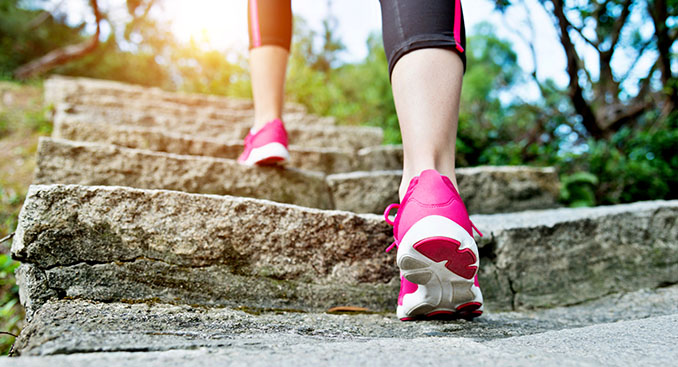5 Steps to Happier Feet This Summer

If you’re keeping track of the steps you’re walking each day, don’t forget what’s getting you there: your feet. Logging millions of steps over a lifetime, your feet are likely to encounter some extra wear and tear during the summer months. Haim Cohen, DPM, a foot and ankle specialist with the TriHealth Orthopedic and Sports Institute, offers the following helpful tips to treat your feet well this summer and for the long term.
1. Choose Summer Sandals with Support
“Of the multiple things that can negatively impact your feet this summer, wearing flip flops tops the list,” shares Dr. Cohen.
He acknowledges the ease of slipping on a pair of flip flops, but he cautions, “Wear them in moderation. They don’t provide support and they’re not made for long distance walking. In addition, due to the fact flip flops don’t have heel straps, the toes must constantly grip the flip flops which fights your natural walking motion.”
Dr. Cohen recommends sandals that provide arch support and a rigid sole, along with a back strap that anchors the heel to the shoe.
“Ask your foot specialist or podiatrist for a summer shoe recommendation and be sure they fit comfortably,” he says. Dr. Cohen notes that improper footwear may lead to painful overuse syndromes such as stress fractures, plantar fasciitis, bursitis and tendinitis.
2. Beware of Going Barefoot
“Although going barefoot makes sense at the beach or pool, there are potential risks,” Dr. Cohen shares. Not wearing protective footwear can result in puncture wounds, possible bacterial infections and plantar warts.
3. Stretch Every Day
“Be proactive, not reactive,” Dr. Cohen shares. “Daily stretches can lengthen a tight Achilles tendon and tight calf muscles that may contribute to conditions such as plantar fasciitis.”
The plantar fascia is a broad band of connective tissue that goes from the heel to the toes. Stretching can keep the tissue flexible to avoid small tissue tears that can add up to significant pain.
Two recommended stretches:
- Balance the balls of your feet on the edge of a step and allow your heels to drop down, stretching your Achilles tendon from heel to calf.
- Lean forward keeping your back straight with your feet about a foot from the wall and both hands on the wall. Move one foot forward with knee bent and lean into the wall until you feel a stretch in your calf and Achilles tendon.
4. Consider Shoe Orthotics
Dr. Cohen recommends investing in a good pair of custom, molded shoe orthotics for support. He adds that they’re not just for people experiencing foot complications; they offer great prevention against future foot problems.
“If you wear orthotics for six months and then go without them, you can really see the benefits of wearing them” he says. “Orthotics greatly help the body’s alignment and can also help support knees, hips and back.”
5. Wear Sport-Specific Shoes
With increased athletic activity during summer months, Dr. Cohen says it’s important to wear shoes designed for the particular sport such as wearing basketball shoes to play basketball. He adds that a cross-trainer is a good all-purpose shoe.
To prevent foot, shin and ankle injury, replace your running and walking shoes every 300 to 500 miles. For impact sports such as aerobics, basketball, or tennis, replace shoes after 45 to 60 hours of activity.
Related Articles
- Community & News
- Conditions & Care
- Orthopedics
- Patient Stories
- Service Line
- Treatments